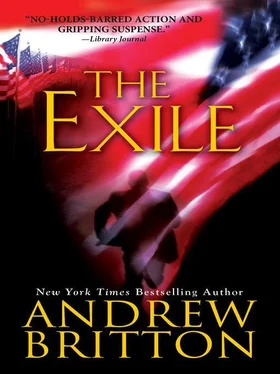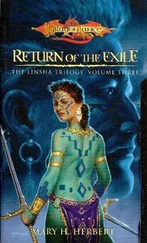Andrew Britton - The Exile
Здесь есть возможность читать онлайн «Andrew Britton - The Exile» весь текст электронной книги совершенно бесплатно (целиком полную версию без сокращений). В некоторых случаях можно слушать аудио, скачать через торрент в формате fb2 и присутствует краткое содержание. Жанр: Триллер, на английском языке. Описание произведения, (предисловие) а так же отзывы посетителей доступны на портале библиотеки ЛибКат.
- Название:The Exile
- Автор:
- Жанр:
- Год:неизвестен
- ISBN:нет данных
- Рейтинг книги:5 / 5. Голосов: 1
-
Избранное:Добавить в избранное
- Отзывы:
-
Ваша оценка:
- 100
- 1
- 2
- 3
- 4
- 5
The Exile: краткое содержание, описание и аннотация
Предлагаем к чтению аннотацию, описание, краткое содержание или предисловие (зависит от того, что написал сам автор книги «The Exile»). Если вы не нашли необходимую информацию о книге — напишите в комментариях, мы постараемся отыскать её.
The Exile — читать онлайн бесплатно полную книгу (весь текст) целиком
Ниже представлен текст книги, разбитый по страницам. Система сохранения места последней прочитанной страницы, позволяет с удобством читать онлайн бесплатно книгу «The Exile», без необходимости каждый раз заново искать на чём Вы остановились. Поставьте закладку, и сможете в любой момент перейти на страницу, на которой закончили чтение.
Интервал:
Закладка:
Again, Whysall did not know whether the latest accusations were legitimate. Many Zuma devotees were calling them “Mbeki’s revenge,” asserting he might have stirred the pot behind the scenes. The only sure thing was that Zuma held a secret trump card this time-an electronic and paper trail of evidence he’d supposedly uncovered indicating that it was his lifelong friend David Joubert, who had been appointed national police commissioner, that was responsible for the dealings he’d supposedly engaged in with Shaik.
Was his evidence real? Concocted? Had Zuma thrown Joubert to the wolves to spare himself another trial? It was all too much of a tangle for Whysall, and he wouldn’t likewise twist his brain into knots trying to figure it out. The simple truth was it wasn’t his concern. Blackwater Worldwide was morally neutral, apolitical, and disinterested in anything but the protection of its client.
Bottom line, so was Whysall. For him the situation boiled down to this: Zuma’s people had approached Blackwater just as the Joubert trial was getting under way. It had been discovered that several of the senior figures in the president’s security detail were former members of the South African Police Service whose loyalty to Joubert ran deep. After discovering this alarming fact, Zuma had disbanded his detail in favor of an outside security contractor. Given its success protecting Paul Bremer in Iraq, Blackwater Worldwide had topped the list of possible candidates.
It still wasn’t known if Joubert’s supporters in the SAPS posed a credible threat, but for Blackwater it represented an inarguably profitable one. The outfit’s senior executives had been more than happy to write up the contract, and on receipt of a substantial deposit they had immediately begun drawing up a security profile for the South African president. Now Zuma had an eight-man team at his disposal, as well as five armored vehicles and a Bell helicopter to provide aerial support. The convoy, Whysall knew, was currently waiting in the parking garage, the entrance to which had been sealed off by the local police, and the helicopter would be called in once the Joubert verdict was read.
What happened from that point forward was anyone’s guess. For the most part, the huge crowd gathered outside cared nothing about what happened to Joubert. Many were die-hard Mbeki supporters; others disenchanted followers of Zuma. A sizable group of people asserted the whole trial was a distraction, a sham in which Joubert had willingly participated to turn attention away from Zuma’s dishonesty.
For the Blackwater team it added up to a mess. In short order the courtroom doors would open, and they would have a potentially serious problem on their hands.
A familiar voice caught Whysall’s attention now, and he quickly adjusted the secure Motorola receiver/transmitter nestled in his right ear. “This is Whysall. Go ahead.”
“Whysall, Kealey. What’s happening out there?”
Whysall took a quick look around, trying to gauge the mood of the crowd. Ryan Kealey, he knew, was inside the courtroom, sitting not more than a few feet from the South African president. Zuma had insisted on attending the last day of the trial, and despite his best efforts, Kealey had not been able to talk him out of it.
“The people out here are getting antsy,” Whysall said. “And additional police units arrived in the square a few minutes ago. Six more vehicles and fifteen officers, for a total of fifteen and eighty-damned if I know whether they’re friends or foes. Otherwise, there’s nothing to report.”
“Okay, just sit tight. The jury’s coming out now. Make sure everyone is ready to move. Out.”
“Copy that, out.”
Whysall immediately relayed the information to the rest of the team, then returned his attention to the crowd milling around him. Approximately five minutes later he heard a rumble of activity on the other side of the courtroom doors. Whysall knew the sound could only mean Zuma had finished testifying in the main chamber.
Around him, beneath the building’s gilded ceiling, dozens of reporters immediately began fighting for position, thrusting their microphones and cameras at arm’s length over the rope line. Behind the assembled media, the crowd of onlookers and protesters pushed forward, so that the narrow aisle leading from the main chamber to the courthouse entrance seemed to grow narrower with each passing second.
Whysall studied the chaotic scene with a sense of rising dread. He didn’t understand why the general public had been granted access. It made for a security nightmare despite the manned checkpoint and the magnetometer positioned inside the main entrance. As bad as it was inside the building, though, it was ten times worse outside. The Johannesburg police had set up blocks on either end of Von Brandis and Kerk, the two intersecting streets in front of the courthouse, but their focus had been limited to vehicular traffic. They had done virtually nothing to prevent the unruly mob from congregating in front of the building, and Whysall suspected that the police would not be inclined to wrestle with those people when the time came for them to leave, especially after what had just transpired inside the main chamber.
Jacob Zuma had just testified against the head of the SAPS. With some of Joubert’s supporters having managed to find their way onto Zuma’s security detail, it seemed possible-even likely-that many of the police officers guarding the building were privately supporting the crowd elements hostile to the Zulu president. That the police might not be eager to facilitate Zuma’s safe departure was something Whysall hadn’t considered until this moment, avoiding it in his reluctance to let his mind stray into the intricacies of South Africa’s affairs. But this was one instance when a client’s standing with an internal arm of his own government might well have a direct bearing on his safety.
Whysall knew what it could mean if he was right, and he decided to pass his concerns up the ladder. Just as he was about to speak, though, his earpiece crackled to life.
“All lobby personnel, tighten up on the rope line. We’re on the way out.”
Whysall immediately acknowledged the transmission, then listened as the rest of the team followed suit. Thirty seconds later he was in position, and he watched as the heavyset police officer standing in front of the courtroom doors lifted a radio to his lips. The man mumbled a few words, then stepped to one side of the massive oak doors. The doors were pushed open from the other side, and two plainclothes police officers quickly locked them into place against the walls. Then the crowd erupted as Zuma and his entourage swept out of the main chamber and into the lobby.
CHAPTER 5
KHARTOUM, SUDAN
Walter Reynolds, the U.S. chief of mission in the Republic of Sudan, stood at the small, barred window of his corner office and sipped from a cup of steaming black coffee, his twelfth of the day. As he took in the sweeping view of downtown Khartoum-the chaotic jumble of dun-colored buildings, olive green trees, and domed mosques that formed the city center, all of it backed by the towering flats of Barlaman Avenue and divided by the twin routes of the Nile-he was suffused by a sense of burning resentment, the same bitter anger he felt each time he stopped to consider the prospect of another two years in the sweltering pit of North Africa.
Reynolds had assumed the post of charge d’affaires just ten months earlier, shortly after leaving his previous post in Cote d’Ivoire, but he was already sick of the place. In fact, he had been ready to leave the day he arrived, and it wasn’t just because of the heat.
In his thirty years with the Foreign Service, Reynolds had come to understand just how vast the cultural gap between the United States and the rest of the world actually was. Nevertheless, he had always made an effort to appreciate the cultural practices of the countries to which he was assigned, even when he found them personally distasteful. He’d also learned that what counted as “acceptable” social behavior could vary greatly from country to country. He had done his best to take this in stride, and for the most part, he’d succeeded. After all, that was part of being a diplomat. Some level of feigned interest-or acceptance-was occasionally called for, and Reynolds could disguise his inner disgust with the best of them. During his time in Sudan, he’d found it necessary to do just that, and with far more frequency than usual.
Читать дальшеИнтервал:
Закладка:
Похожие книги на «The Exile»
Представляем Вашему вниманию похожие книги на «The Exile» списком для выбора. Мы отобрали схожую по названию и смыслу литературу в надежде предоставить читателям больше вариантов отыскать новые, интересные, ещё непрочитанные произведения.
Обсуждение, отзывы о книге «The Exile» и просто собственные мнения читателей. Оставьте ваши комментарии, напишите, что Вы думаете о произведении, его смысле или главных героях. Укажите что конкретно понравилось, а что нет, и почему Вы так считаете.










